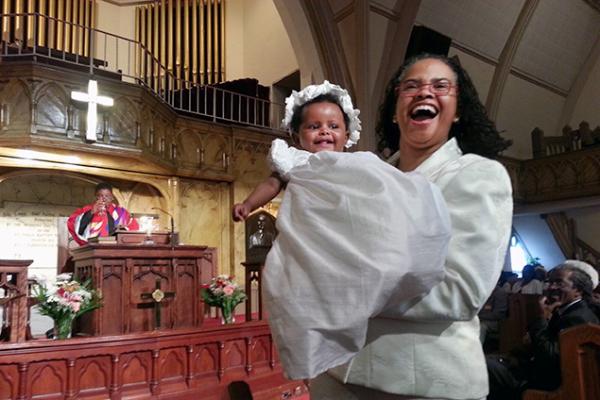American Jesuits are pushing members of Congress who were educated at the Catholic order’s schools to pass aid for thousands of refugee children who have surged across the border in Texas in recent months, calling proposals to swiftly deport them “inhumane and an insult to American values.”
“I ask you, as a leader, a parent, and a Catholic, to uphold an American tradition of which we are all proud,” the Rev. Thomas Smolich, head of the U.S. Jesuit conference, wrote to House Speaker John Boehner and 42 other House members who graduated from Jesuit high schools and colleges.
“We must welcome the refugee, the victim of trafficking, the child who has been abused or abandoned,” Smolich wrote in the July 29 letter. “Let us follow in the footsteps of Jesus when he said, ‘Let the children come to me, and do not prevent them; for the kingdom of heaven belongs to such as these.’”
Since last fall, more than 57,000 unaccompanied minors have flooded across the U.S.-Mexico border, mainly in south Texas, most of them from El Salvador, Guatemala and Honduras.
The migrants are often driven out by endemic violence in their home countries and drawn to the U.S. by prospects of better economic opportunities or the chance to reunite with their families.
But the influx has created a humanitarian crisis that has become a political wedge issue.
When Philadelphia’s St. Paul Baptist Church hired the Rev. Leslie Callahan as its first female pastor, in 2009, she was nearing her 40th birthday and the tick-tock of her biological clock was getting hard to ignore.
She delighted in her ministry but also wanted a husband and children in her life. The husband she couldn’t do much about — he just hadn’t stepped into her life.
Now Callahan is mother to 22–month-old Bella, who was welcomed joyously by what the pastor describes as “a pretty traditional Baptist church.” She describes Bella’s arrival as “a divine regrouping,” a different answer to her prayers than the traditional mommy-daddy-baby model she had envisioned.
Ever since unmarried sitcom anchorwoman Murphy Brown shocked much of the country in 1991 by deciding to raise her baby on her own, the culture has changed. Once unthinkable and later unacceptable, single mothers by choice today are met with less judgment.
In fact, according to federal statistics, more than 40 percent of births are to unmarried mothers. But what if, like Callahan, the single mom by choice is a minister, or a rabbi?
The issues sound like they belong on the therapist’s couch:
The couple that hasn’t had sex eight months into their marriage.
The parents who can’t deal with their son’s homosexuality.
The male teen who wants to be called by a girl’s name.
But they’re also the kinds of topics that frequently crowd the inbox of Russell Moore, who recently marked his first anniversary as the Southern Baptist Convention’s top public policy expert.
Though he often grapples with contentious political issues — the Hobby Lobby case, religious persecution, and, most recently, the immigrant border crisis — Moore has spent much of his first year at the Ethics & Religious Liberty Commission writing blog posts on Christian sexual ethics.
“Probably day to day I’m dealing with more church issues of how do we deal with these tough ethical issues,” he said recently.
In the northern Pacific Ocean, there is a giant whale named 52 Hertz. Scientists named him that because when he sings, the frequency of his whale song is around 52 Hertz. When other whales sing their songs, they sing at frequencies between 15 and 25 Hertz. His song cannot be heard by any other whale. He is known as the loneliest whale in the world.
Normally whales are communal creatures. They live their lives in family groups. They migrate from warm waters to cooler waters to give birth and find food. They follow the same migration route from year to year. 52 Hertz is different. He lives alone. He does not follow a migration route. He wanders the ocean, a lonely, wandering whale.
We do not know what kind of whale 52 Hertz is. He could be a deformed blue or fin whale. He could be a cross breed of those two types of whales. He could be a kind of whale we have yet to discover. He is an unknown whale.
Soon a team will set out on a seven-week expedition in search of 52 Hertz. Will they find him? Will he find them? Does he want to be found? I wonder.
In the Judeo-Christian tradition, God calls us to love and show compassion to the stranger, particularly those who suffer. But first, they must become real to us. And there is nothing more viscerally real, perhaps, than the face of a dead child.
Is it possible to let our hearts by broken by the dead children of our enemy? Is our God big enough to allow us to imagine that God loves those we fear and despise?
Not until, I believe, they have faces.
Iraq, Syria, Ukraine, Israel, Gaza – though religious fervor is alive and well in these embattled areas, loathing, horror, and hatred seem to reign, darkness to rule. In the grim night, we cannot see each other’s faces.
More than 100 faith leaders and immigration activists were arrested today during an act of civil disobedience outside of the White House. The activists were calling on President Barack Obama to take executive action to immediately stop deportations and to deal with the crisis of unaccompanied minors at the border.
"We have come to Washington, D.C., to tell to President Obama and Congress that kicking out suffering immigrant families and unaccompanied children is not the answer,” Bishop Minerva Carcaño, the United Methodist Bishop in Los Angeles, said. “Immediately stopping the deportations and extending due process to children escaping the violence of drug cartels, gangs and poverty is the just way to respond."
Other participants in the protest saw the struggle for immigration reform as part of a larger struggle for justice.
"As someone who has benefited from the courage and civil disobedience of the leaders of the Civil Rights Movement, I cannot stand idly by as I see unjust immigration laws damage our communities and our nation,” Rev. John L. McCullough, President and CEO of Church World Service, said. “It is a moral imperative that we take action now, particularly after the House Republican leadership has miserably failed to enact immigration reform that the majority of Americans roundly support."
This action comes while the Obama administration is conducting a review of deportation policies and pushing for emergency funding for the crisis of unaccompanied children arriving at the border.
This week began in song and prayer outside the Environmental Protection Agency.
The government employees walking past our prayer circle definitely thought we were unusual; for Sojourners, though, publicly witnessing to our calling as Christians in care for creation is just another day on the job. We gathered with interfaith partners for a morning blessing to kick off the EPA’s hearings on the Clean Power Plan – an ambitious plan to curb carbon emissions from our largest source, power plants. Our goal was to show EPA and the nation that people of faith care deeply about what human sin has done to creation, and how all of God’s creation – including people – are suffering and will continue to suffer from climate change.
The next day, I was back at the EPA, this time to offer my testimony during their second day of hearings.
When I first saw Americans joining in solidarity with Iraqi Christians through the #WeAreN hashtag and protest campaign, I was encouraged. Our team at Preemptive Love Coalition had been sounding the alarm about the targeted persecution of minorities in Iraq through private emails and social media messages for weeks, in between making urgent appeals in our effort to provide lifesaving heart surgeries for children amid the violence.
Most of our efforts were largely unsuccessful before the “Islamic State” gave Mosul’s Christians an ultimatum to (1) convert to Islam; (2) pay a submission tax; or (3) “face the sword.”
After Islamist militants began marking the homes of Christians in red paint with the Arabic letter “N” (Nazarene) for extermination or expropriation, we tried again to use our proximity to the problem in Iraq to provoke our friends in America to pay attention by tagging a photo “#WeAreN,” in which I had symbolically marked myself with an Arabic “N.”
But it was not strictly an act of solidarity with Iraqi Christians. We had the targeting of Turkmen, Yezidi, Shabak, and even Sunni Muslims in view, as well. #WeAreN was more about the marking of Christians; less about the marking of Christians.
Muslims and minorities across Iraq immediately sensed the gravity of the tactics deployed by the Islamic State: if one group is marked, we are all marked. If we stand by in silence today while others are marked for extinction, our time will come, and there will be no one left to stand for us.
In response, Muslims across Iraq joined together in protest, prayer, and viral photographs saying “We are Iraqi. We are Christians.”
Across the country, dangerous people with records of domestic violence, stalking, and aggression have no legal restriction keeping them from obtaining guns. Today, the Senate Judiciary Committee held a hearing to explore the intersection of domestic violence and gun violence. The hearing discussed major loopholes in the landmark Violence Against Women Act (VAWA), which successfully prohibited some convicted domestic abusers from gaining access to firearms. Yet even with the prohibitions in VAWA, abusers who don’t share a home with their intimate partner and abusers convicted of misdemeanor stalking charges are free to keep the weapons they have and to purchase new weapons.
“I am here today to speak for my sister Zina. I speak for Zina and her entire family because Zina is not here to speak for herself.”
Elvin Daniel, and NRA member and gun owner, lost his sister to domestic violence with a firearm and testified today in support of Sen. Amy Klobuchar’s (D-Minn.) S. 1290: Protecting Domestic Violence and Stalking Victims Act of 2013.
The tragic loss of Zina’s life is not an isolated incident. A study about the relationship between domestic violence and gun violence released by the Center for American Progress highlights how deadly this major loophole can be for thousands of women. The statistics are stunning:
- While 2.5 percent of men who are murdered are killed by a female intimate partner, 34 percent of women who are murdered are killed by a male intimate partner.
- Of all the women killed by male intimate partners from 2001-2012, 55 percent are killed with a firearm.
- More women (6,410) in the United States have been killed by a significant other with a firearm from 2001-2012 than U.S. troops have died in the wars in Iraq and Afghanistan.
Many Turkish women were doubled over with laughter Tuesday after their country’s deputy leader said in a speech assailing “moral corruption” that women should not laugh in public and should not talk on their mobile phones so much.
Social media lit up as news of the speech spread, with hundreds of Turkish women posting photos of themselves and friends laughing in public places. Popular hashtags included #kahkaha (laugh) and #direnkahkaha (resist, laugh).
The Hurriyet Daily News offered this excerpt from Arinc’s remarks: “Chastity is so important. It is not only a name. It is an ornament for both women and men. [She] will have chasteness. Man will have it, too. He will not be a womanizer. He will be bound to his wife. He will love his children. [The woman] will know what is haram [sin] and not haram. She will not laugh in public. She will not be inviting in her attitudes and will protect her chasteness.”









